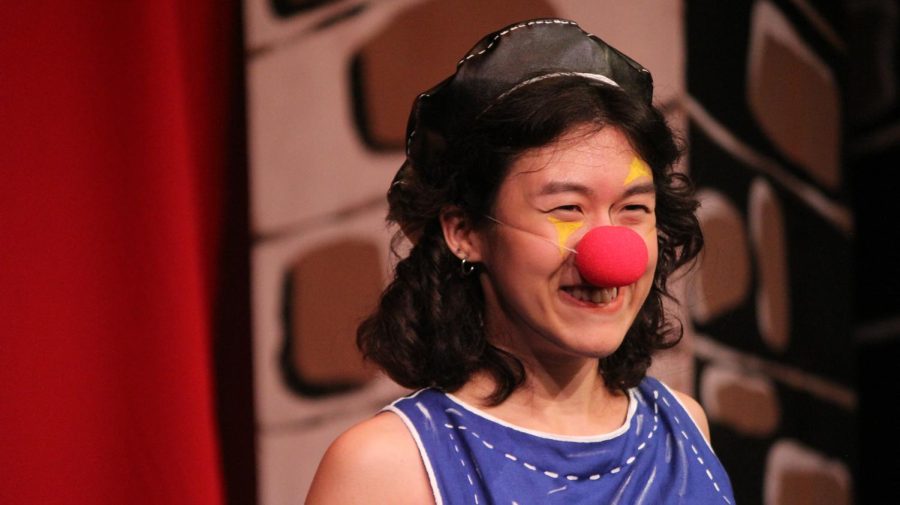Comedy of Errors brings Shakespeare to Loyola
Senior Asta Balakauskas shows her comedy skills for Loyola’s adaptation of Shakespeare’s Comedy of Errors.” The show opned. April 20, 2023. Courtesy of Loyola TAD
April 29, 2023
The Theatre and Dance Department’s production of “Comedy of Errors,” directed by assistant professor Helen Jaksch, opened with the hopes of showing audiences Shakespeare in a broadly accessible way.
Director and writer Sara Holdren wrote this adaptation of “Comedy of Errors”, as well as co-founded the theater company Tiltyard where she adapted several other Shakespeare plays.
Jaksch requested to put on a production of Holdren’s “Comedy of Errors” at Loyola, which Holdren agreed to since her adaptation was crafted with young actors in mind.
“What I wanted to do when I set about creating this adaptation was to take the idea of a ‘comedy of errors’ and mesh that as an external structure with the plot of the play,” she said.
Holdren said she hoped that her adaptation would offer opportunities to the actors at Loyola because it is a production that both offers and demands a full-bodied ensemble investment.
“It’s a celebration of the ensemble and community, a group coming together against all odds to pull off this wild, ridiculous feat,” she said. “You can’t do this show unless it’s full collaboration there in the moment supporting your partner, catching the balls thrown to you…that to me was an important part of my college experience, and I was excited to see whether it could create that for the Loyola ensemble too.”
Both Holdren and Jaksch agreed that Shakespeare feels inaccessible to most audiences who fear it is not for them, not relatable, or too geared toward the more educated.
“I hope that people leave saying, ‘wow. I thought I hated Shakespeare, but that was kind of awesome.’ Shakespeare’s work is just material, and we can rip it apart and put it back together however we want,” Jaksch said. “Some plays invite us to think, some call us to action, some help us express the grief and pain of our world. This play gives us permission to laugh together,” Jaksch said.
Theater arts senior Asta Balakauskas, who plays one of the Dromio twins in Comedy of Errors, said a lot of people have misconceptions about Shakespeare’s work since it’s old and isn’t the language we use nowadays.
However, she encourages audiences to engage with his work, especially his comedy. She said this adaptation is a great way to do that.
“I feel like it is so universal that even if you might not be a huge fan of Shakespeare, you’d still understand it and laugh at it,” she said. “It’s important because we get to take Shakespeare down from the pedestal a bit and feel like his work is accessible to everyone, which is how we should feel all the time.”
Jaksch said it was rewarding to watch the actors grow in their confidence with Shakespeare’s verse and with the physical comedy the show requires. It has been years now since the department last produced a classical play, Jaksch said, and they hoped to offer that experience again.
Jaksch congratulated the team of student designers and leaders as well, who helped guide and build the world of the play.
“It’s clear that everyone in the ensemble comes into the room to take care of each other and of the show, and I can’t really ask for more than that,” they said. “Comedy is hard. It’s all about timing, precision, and being willing to look absolutely ridiculous, but I love that I can be surprised and delighted every day.”








